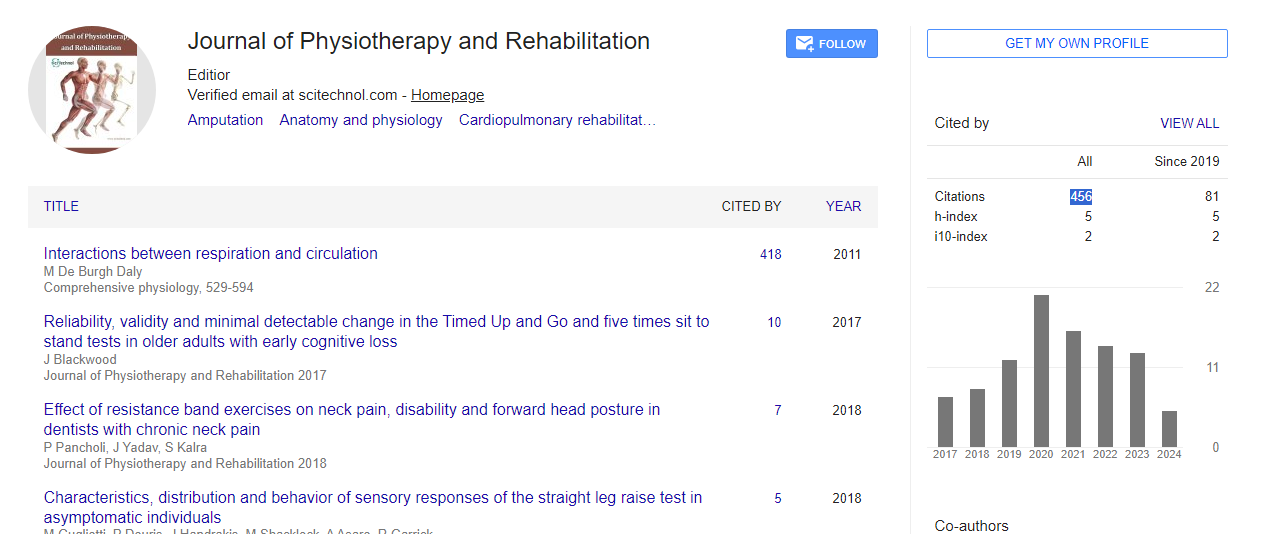Opinion Article, J Physiother Rehabi Vol: 8 Issue: 4
Role of Multidisciplinary Teams in Neurorehabilitation: Integrating Expertise to Improve Functional Recovery and Patient Care
Dioggi Kutt*
1Department of Paediatric Neurosciences, Evelina London Children’s Hospital, London, United Kingdom
*Corresponding Author: Dioggi Kutt,
Department of Paediatric Neurosciences,
Evelina London Children’s Hospital, London, United Kingdom
E-mail: frazzmu@rsio.edu
Received date: 23 July, 2024, Manuscript No. JPTR-24-147323
Editor assigned date: 25 July, 2024, PreQC No. JPTR-24-147323 (PQ);
Reviewed date: 08 August, 2024, QC No. JPTR-24-147323
Revised date: 15 August, 2024, Manuscript No. JPTR-24-147323 (R);
Published date: 22 August 2024, DOI: 10.4172/JPTR.1000179.
Citation: Kutt D (2024) Role of Multidisciplinary Teams in Neurorehabilitation: Integrating Expertise to Improve Functional Recovery and Patient Care. J Physiother Rehabi 8:4.
Description
Neurorehabilitation is a complex and functional field aimed at helping individuals recover from neurological impairments caused by conditions such as stroke, traumatic brain injury and spinal cord injury. Effective neurorehabilitation often requires a comprehensive approach. A multidisciplinary team in neurorehabilitation typically includes professionals from various specialties such as physiatrists, neurologists, physical therapists, occupational therapists, speech therapists, neuropsychologists and social workers. Each member brings unique skills and perspectives, contributing to a holistic approach to patient care.
Physiatrists (Specialists in Physical Medicine and Rehabilitation) and neurologists play a central role in diagnosing and managing neurological conditions. They provide medical oversight, coordinate care plans and monitor the progress of treatment. Their expertise ensures that rehabilitation strategies align with the medical needs of the patient, including managing comorbidities and addressing potential complications. Physical therapists focus on improving motor function, strength and mobility. They design and implement exercise control and physical interventions designed to the patient’s specific needs. Occupational therapists assist patients in developing the skills necessary for daily living and working activities. They focus on enhancing fine motor skills, cognitive abilities and adaptive techniques to help patients achieve greater independence. Their interventions often involve modifying the home or work environment to support the patient’s functional goals.
Speech therapists address communication and swallowing difficulties that may arise from neurological impairments. They work with patients to improve speech clarity, language skills and swallowing function, which are essential for effective communication and safe eating. Their contributions are vital for enhancing the quality of life and social interactions for patients. Neuropsychologists assess and manage cognitive and emotional aspects of neurological disorders. They conduct evaluations to identify cognitive deficits, such as memory or executive function impairments and provide interventions to address these issues. Their expertise helps in understanding the impact of neurological conditions on mental health and cognitive function.
Social workers play an important role in supporting patients and their families by addressing psychosocial needs. They provide counseling, connect families with community resources and assist with navigating insurance and financial challenges. Their support is important for managing the emotional and practical aspects of living with a neurological condition. A multidisciplinary team provides a comprehensive approach to neurorehabilitation, addressing the physical, cognitive, emotional and social needs of the patient. Effective coordination among team members ensures that treatment plans are cohesive and well-integrated. Regular team meetings and communication facilitate the sharing of information and updates allowing for adjustments to the care plan based on the patient’s progress and evolving needs. Research indicates that multidisciplinary approaches in neurorehabilitation lead to improved functional outcomes and higher patient satisfaction. By combining different therapeutic modalities and expertise patients benefit from a more designed and comprehensive approach to their rehabilitation, which can result in faster and more sustainable recovery.
Conclusion
The role of multidisciplinary teams in neurorehabilitation is integral to achieving optimal recovery and improving patient care. By integrating the expertise of various healthcare professionals these teams provide a comprehensive, coordinated and patient-centered approach to rehabilitation. The collaborative nature of multidisciplinary teams enhances the effectiveness of interventions supports. As neurorehabilitation continues to evolve the importance of multidisciplinary collaboration will remain central to advancing the field and delivering high-quality care.
 Spanish
Spanish  Chinese
Chinese  Russian
Russian  German
German  French
French  Japanese
Japanese  Portuguese
Portuguese  Hindi
Hindi 